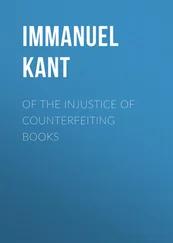Secondly, it is properly the unconditioned alone that reason seeks in this serially and regressively conducted synthesis of conditions. It wishes, to speak in another way, to attain to completeness in the series of premisses, so as to render it unnecessary to presuppose others. This unconditioned is always contained in the absolute totality of the series, when we endeavour to form a representation of it in thought. But this absolutely complete synthesis is itself but an idea; for it is impossible, at least before hand, to know whether any such synthesis is possible in the case of phenomena. When we represent all existence in thought by means of pure conceptions of the understanding, without any conditions of sensuous intuition, we may say with justice that for a given conditioned the whole series of conditions subordinated to each other is also given; for the former is only given through the latter. But we find in the case of phenomena a particular limitation of the mode in which conditions are given, that is, through the successive synthesis of the manifold of intuition, which must be complete in the regress. Now whether this completeness is sensuously possible, is a problem. But the idea of it lies in the reason — be it possible or impossible to connect with the idea adequate empirical conceptions. Therefore, as in the absolute totality of the regressive synthesis of the manifold in a phenomenon (following the guidance of the categories, which represent it as a series of conditions to a given conditioned) the unconditioned is necessarily contained — it being still left unascertained whether and how this totality exists; reason sets out from the idea of totality, although its proper and final aim is the unconditioned — of the whole series, or of a part thereof.
This unconditioned may be cogitated — either as existing only in the entire series, all the members of which therefore would be without exception conditioned and only the totality absolutely unconditioned — and in this case the regressus is called infinite; or the absolutely unconditioned is only a part of the series, to which the other members are subordinated, but which Is not itself submitted to any other condition. 48 In the former case the series is a parte priori unlimited (without beginning), that is, infinite, and nevertheless completely given. But the regress in it is never completed, and can only be called potentially infinite. In the second case there exists a first in the series. This first is called, in relation to past time, the beginning of the world; in relation to space, the limit of the world; in relation to the parts of a given limited whole, the simple; in relation to causes, absolute spontaneity (liberty); and in relation to the existence of changeable things, absolute physical necessity.
We possess two expressions, world and nature, which are generally interchanged. The first denotes the mathematical total of all phenomena and the totality of their synthesis — in its progress by means of composition, as well as by division. And the world is termed nature, 49 when it is regarded as a dynamical whole — when our attention is not directed to the aggregation in space and time, for the purpose of cogitating it as a quantity, but to the unity in the existence of phenomena. In this case the condition of that which happens is called a cause; the unconditioned causality of the cause in a phenomenon is termed liberty; the conditioned cause is called in a more limited sense a natural cause. The conditioned in existence is termed contingent, and the unconditioned necessary. The unconditioned necessity of phenomena may be called natural necessity.
The ideas which we are at present engaged in discussing I have called cosmological ideas; partly because by the term world is understood the entire content of all phenomena, and our ideas are directed solely to the unconditioned among phenomena; partly also, because world, in the transcendental sense, signifies the absolute totality of the content of existing things, and we are directing our attention only to the completeness of the synthesis — although, properly, only in regression. In regard to the fact that these ideas are all transcendent, and, although they do not transcend phenomena as regards their mode, but are concerned solely with the world of sense (and not with noumena), nevertheless carry their synthesis to a degree far above all possible experience — it still seems to me that we can, with perfect propriety, designate them cosmical conceptions. As regards the distinction between the mathematically and the dynamically unconditioned which is the aim of the regression of the synthesis, I should call the two former, in a more limited signification, cosmical conceptions, the remaining two transcendent physical conceptions. This distinction does not at present seem to be of particular importance, but we shall afterwards find it to be of some value.
48 The absolute totality of the series of conditions to a given conditioned is always unconditioned; because beyond it there exist no other conditions, on which it might depend. But the absolute totality of such a series is only an idea, or rather a problematical conception, the possibility of which must be investigated — particularly in relation to the mode in which the unconditioned, as the transcendental idea which is the real subject of inquiry, may be contained therein.
49 Nature, understood adjective (formaliter), signifies the complex of the determinations of a thing, connected according to an internal principle of causality. On the other hand, we understand by nature, substantive (materialiter), the sum total of phenomena, in so far as they, by virtue of an internal principle of causality, are connected with each other throughout. In the former sense we speak of the nature of liquid matter, of fire, etc., and employ the word only adjective; while, if speaking of the objects of nature, we have in our minds the idea of a subsisting whole.
Section II. Antithetic of Pure Reason.
Table of Contents
Thetic is the term applied to every collection of dogmatical propositions. By antithetic I do not understand dogmatical assertions of the opposite, but the self-contradiction of seemingly dogmatical cognitions (thesis cum antithesis, in none of which we can discover any decided superiority. Antithetic is not, therefore, occupied with one-sided statements, but is engaged in considering the contradictory nature of the general cognitions of reason and its causes. Transcendental antithetic is an investigation into the antinomy of pure reason, its causes and result. If we employ our reason not merely in the application of the principles of the understanding to objects of experience, but venture with it beyond these boundaries, there arise certain sophistical propositions or theorems. These assertions have the following peculiarities: They can find neither confirmation nor confutation in experience; and each is in itself not only self-consistent, but possesses conditions of its necessity in the very nature of reason — only that, unluckily, there exist just as valid and necessary grounds for maintaining the contrary proposition.
The questions which naturally arise in the consideration of this dialectic of pure reason, are therefore: 1st. In what propositions is pure reason unavoidably subject to an antinomy? 2nd. What are the causes of this antinomy? 3rd. Whether and in what way can reason free itself from this self-contradiction?
A dialectical proposition or theorem of pure reason must, according to what has been said, be distinguishable from all sophistical propositions, by the fact that it is not an answer to an arbitrary question, which may be raised at the mere pleasure of any person, but to one which human reason must necessarily encounter in its progress. In the second place, a dialectical proposition, with its opposite, does not carry the appearance of a merely artificial illusion, which disappears as soon as it is investigated, but a natural and unavoidable illusion, which, even when we are no longer deceived by it, continues to mock us and, although rendered harmless, can never be completely removed.
Читать дальше












